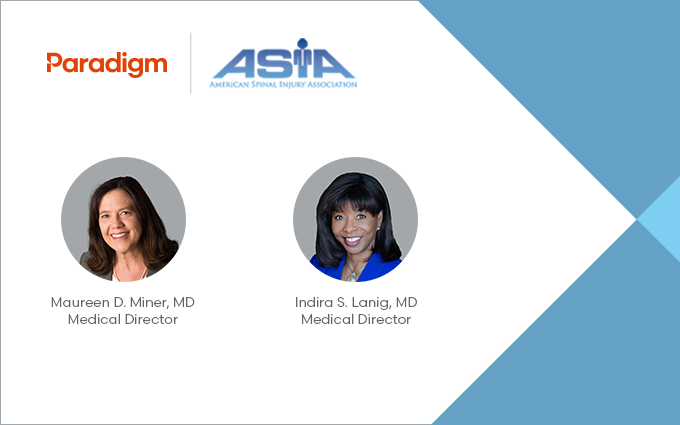07/21/2022

ASIA, the American Spinal Cord Injury Association, is an organization dedicated to advancing the field of spinal cord injury (SCI) care, education, and research. For the second year in a row, two Paradigm Medical Directors—Maureen D. Miner, MD, and Indira S. Lanig MD—served as co-chairs of the ASIA Annual Scientific Meeting. Drs. Lanig and Miner have been closely involved with ASIA for years. In 2021, both were selected to serve on the Association’s board of directors.
This year’s Annual Scientific Meeting, held May 18–20 in New Orleans, Louisiana, brought together industry-leading researchers, clinicians, and other SCI professionals for a range of unique courses, panels, and sessions. After the event, we spoke with Drs. Lanig and Miner about their experience at the meeting and their years working with ASIA to advance the state of spinal cord injury for the full spectrum of patients, including injured workers.
How was your experience at the meeting and serving together as co-chairs?
Dr. Miner: I have been involved with ASIA for more than 25 years. I was brought in initially as a resident by my attending SCI physician. For me, to serve ASIA as the Program Chair for two years was both an honor and a privilege. After this year’s meeting, I contacted my now-retired mentor from the SCI unit, and he told me how proud he was of me for my continued work with the organization.
To facilitate an internationally respected scientific program through ASIA with my like-minded friend and colleague, Dr. Lanig, was frankly over-the-top awesome. Together, our laser focus and fundamental philosophies regarding SCI were perfectly blended. We had a blast working together to carry out our roles. I truly believe we brought a fresh and mighty energy and felt so welcomed by the conference attendees.
Dr. Lanig: I agree wholeheartedly. It has been a pleasure to have served together as co-chairs with Dr. Miner, with whom I have such a great partnership. She and I came in focused on promoting the value of interprofessional and cross-sector dialogue to optimize clinical care, research, and outcomes for SCI. We have been so excited to see positive feedback from attendees, showing us how much this thematic approach was both desired and well received.
What impact do you feel you were able to make and what perspectives were you able to add in the conference chair role?
Dr. Lanig: Our backgrounds may be the minority in this research-focused arena in several ways—including gender- and community-based clinical focus—but I believe they are desired and highly relevant perspectives to the ASIA leadership voice. I was thrilled to work with Dr. Miner to contribute our mutual knowledge and pragmatic insights. Above all, our overriding commitment is to infuse evidence-supported practice for what is presented to clinicians, researchers, ASIA members—and especially, people living with an SCI.
Dr. Miner: I am a practicing physiatrist who works in the trenches every day, treating SCI patients. For the majority of my career, my focus has been more clinical, which is a little outside the norm for a research-focused group like ASIA. When I was chosen as Program Chair, I asked more than once if I was really the best choice! They assured me that I brought an original, clinical edge to the program.
I wouldn’t choose anyone else but Dr. Lanig to work with, either. We are a clinical “match made in heaven” that brought many unique viewpoints to the conference.
What were the biggest topics of interest this year?
Dr. Miner: A few of the hot topics at the conference this year were Neuromodulation, Aging with SCI, and Diversity. As Dr. Lanig touched on, a mutual goal that carried into all aspects of the program was to transmit the latest research and knowledge in a way that was relevant and beneficial for actively practicing clinicians—particularly those who may be geographically remote from the “big centers.” We’re both committed to improving the state of care and developing new best practices to ultimately ensure our SCI patients will receive the best possible outcomes.
How does your work with Paradigm influence your work with the ASIA organization–and vice versa?
Dr. Lanig: I believe our leadership positions in both arenas are greatly informed by the range and complexity of the real-world, community-based catastrophic cases in which we are involved as Paradigm Medical Directors. In looking at this interrelationship, one person I want to highlight and acknowledge is our Paradigm Medical Director preceptor, Dr. Kenneth Parsons. Dr. Parsons is a past-president of ASIA, and continues to influence SCI best practices, both within Paradigm and the SCI leadership community at large.
Dr. Miner: My job at Paradigm fulfills a mutual vision with ASIA—to provide the best and most appropriate care to people dealing with an SCI. Attending and learning at a conference like ASIA is a phenomenal learning opportunity for any clinician who treats this highly challenging patient population. Being Program Chair has given me an extended edge to my knowledge base, which has informed my Paradigm-assigned cases on multiple occasions. I pray to be able to continue to bring the latest and best practice information to Paradigm as an elected ASIA board member to further Paradigm’s vision in SCI medicine.
Learn about Paradigm’s commitment to clinical expertise and the strong clinical partnerships that enable advancement and understanding across multiple fields.